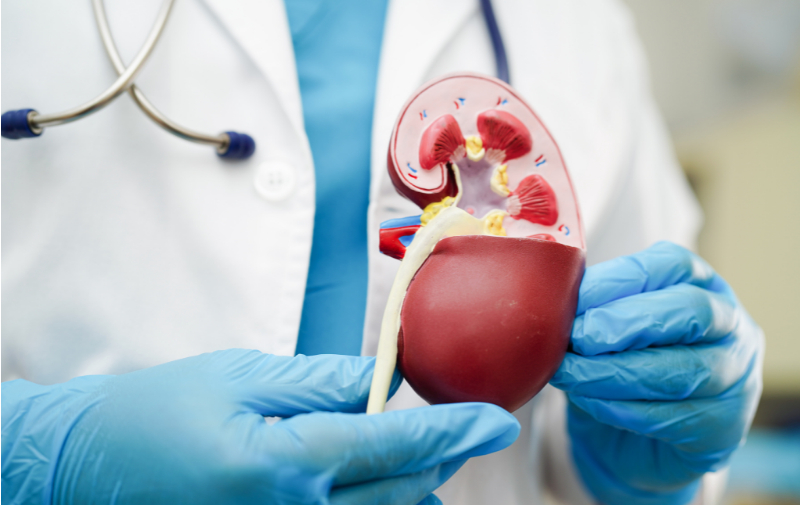A creatinine serum test measures the levels of creatinine, a waste product secreted by kidneys, in an individual's blood. Creatinine is a by-product of the breakdown of muscle tissue and is usually flushed out at a steady rate by normally functioning kidneys. It acts as an indicator of your kidney health.
Creatinine levels in the blood can be directly related to proper or improper kidney functioning, which can diagnose and monitor renal disorders such as chronic kidney disease and acute renal failure.
When to get a Creatinine Serum Test done
Creatinine in blood gives rise to specific symptoms hinting at kidney disorders. These symptoms include lower back pain around the kidneys, swelling in the wrists, ankles, abdomen, or face, fluctuating urine frequency and concentration, loss of appetite, vomiting, nausea, high blood pressure, fatigue, and inability to sleep.
Such symptoms may indicate various ailments such as an enlarged prostate, kidney stones, glomerulonephritis (inflammation of glomeruli), diminished blood flow to kidneys (may be due to diabetes, dehydration, or cardiac failure), pyelonephritis (bacterial infection of the kidneys), streptococcal infections, or kidney cell death as a result of drug abuse.
What does Creatinine in Blood Measure?
The Levels of creatinine in blood uncover renal complications and aid in diagnosing any ailments that may augment the risk of kidney diseases such as hypertension and diabetes. A creatinine test can also monitor the function of a transplanted kidney and the side effects of certain drugs on normal renal functioning.
Should I prepare before getting a Creatinine Test?
Creatinine serum test is a simple procedure with little to no preparation required. Unlike other specific blood tests, fasting is not a prerequisite. However, it is essential to inform your physician about any medications (either prescription or over the counter) that you may be on as some medicines tend to elevate creatinine levels without triggering any harmful side effects that can interfere with your test results' accuracy. Such medications may include cimetidine, chemotherapy drugs, cephalosporin antibiotics, or NSAIDs (nonsteroidal anti-inflammatory drugs) such as aspirin or ibuprofen. Your doctor would either limit or stop your dosage before the test or consider the effects when interpreting results.
How is a Creatinine Blood Test carried out?
Creatinine in the blood can be tested quite conveniently by simply drawing a small sample of blood. You are required to expose your arm, a portion of which is sterilized with an antiseptic. A band is then wrapped around your arm to make the veins swell with blood, thereby making them more visible. A needle is then inserted in the said vein, usually on the inner side of the elbow, and blood is collected. The needle is removed, and the blood is deposited in a tube. It is usual to bandage the puncture wound to prevent any infections or blood flow. In case of urine testing, you can provide a sample either in a clinic or at home.
Is Creatinine Testing painful?
A creatinine blood test is not painful except for the slight prick of a needle inserted in your vein. Mild soreness or redness at the puncture site, bruising, pain, infection, dizziness, vertigo, or fainting at the sight of blood in some cases may be some minor risks, although the test is a low-risk procedure overall.
How much does a Creatinine Test cost?
Although the price of creatinine testing may vary from place to place, it is not an expensive procedure and can cost anywhere between $23.00 and $26.00. The lowest price in the United States is charged by Lab Testing API ($24.00) for a simple Creatinine Blood Test. In contrast, LabsMD offers the most expensive cost in the US for a Creatinine Serum blood test with a price amounting to $50.49. SmartClinix, however, provides the most accurate and all-encompassing creatinine testing with amazing discounts. Head over to their website right now and book your creatinine test!
What does the Creatinine Level in my blood mean?
Although creatinine levels in the blood greatly depend on an individual's age, gender, and even muscular build, the average levels range from 0.9 to 1.3 mg/dL in men and 0.6 to 1.1 mg/dL in women 18 to 60 years old. Mg/dL stands for milligrams per deciliter of blood and is the standard unit used for measuring creatinine. Higher than normal levels indicate renal complexities and should be discussed with a doctor. Lower than average creatinine levels, although a rarity, do not pose serious health concerns and may typically stem from conditions causing low muscle mass.
What do the results of a Creatinine Test mean?
Normal and abnormal creatinine ranges are subject to change in various circumstances, and thus, consulting with a doctor is the most prominent and appropriate choice. You can interpret the results of your tests right from the comfort of your home by availing SmartClinix's global telehealth services, virtual medical assistants, and doctors and nurses who are available round the clock.











